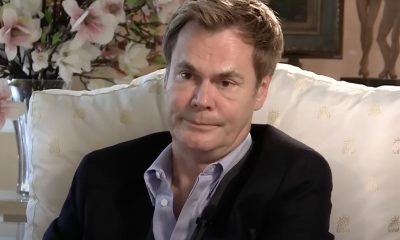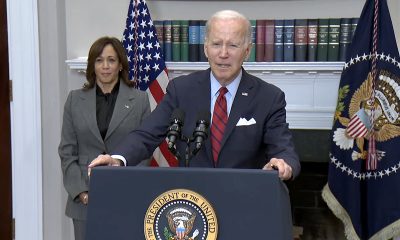News
Looking back: Gay mentions during State of the Union
Clinton, Bush and Obama addressed gays during speeches before Congress
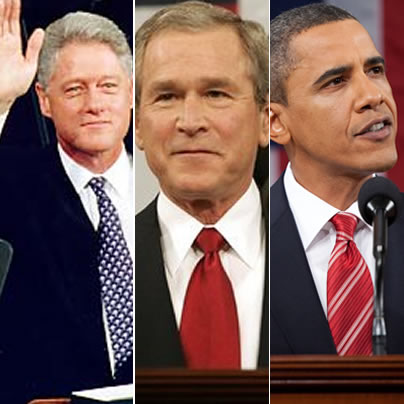
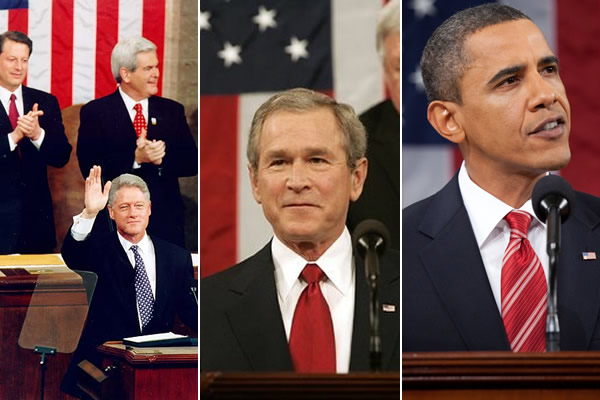
Presidents Bill Clinton, George W. Bush and Barack Obama each mentioned issues relevant to the LGBT community during their State of the Union addresses. (Photos public domain)
The State of the Union address is considered a pivotal speech for U.S. presidents in shaping their agenda for the year ahead, and the last three haven’t shied from including LGBT people in their proposed policies.
Presidents Bill Clinton, George W. Bush and Barack Obama each made references to policy items affecting LGBT people. Clinton was the first, Bush’s proposed policies were entirely negative and Obama has incorporated LGBT people into his speeches consistently.
The Washington Blade has complied a list of mentions of LGBT issues in State of the Union speeches, all of which were made in recent times. The list doesn’t include mentions of HIV-related items, although Clinton, Bush and Obama each called on Congress to appropriate funds to combat the disease in their speeches.
1999 — Clinton calls for hate crimes, ENDA passage
President Clinton made a reference to two pieces of landmark legislation during his 1999 State of the Union, calling on Congress to pass hate crimes protections legislation and the Employment Non-Discrimination Act.
“Discrimination or violence because of race or religion, ancestry or gender, disability or sexual orientation, is wrong, and it ought to be illegal,” Clinton said. “Therefore, I ask Congress to make the Employment Non-Discrimination Act and the Hate Crimes Prevention Act the law of the land.”
After the murder of gay college student Matthew Shepard near Laramie, Wyo., in 1996, Clinton had endorsed legislation to make violent crimes based on anti-gay animus part of federal law. Clinton was also known as a supporter of ENDA, a bill that in its current version would bar workplace discrimination against LGBT people.
2000 – Clinton makes first explicit reference of ‘gay’
The next year, Clinton tried again to encourage Congress to pass hate crimes protection legislation and ENDA, saying for the first time during a State of the Union address the word “gay.”
Clinton made the appeal to pass both pieces of legislation when talking about incidents of hate crimes against minorities throughout the country.
“We saw a young man murdered in Wyoming just because he was gay,” Clinton said. “Last year we saw the shootings of African Americans, Asian Americans, and Jewish children just because of who they were. This is not the American way, and we must draw the line. I ask you to draw that line by passing without delay the Hate Crimes Prevention Act and the Employment Non-Discrimination Act.”
After Clinton’s call, hate crimes legislation received a floor vote in 2000 as part of an amendment to the major Pentagon budget legislation. No attempt was made to pass ENDA on the floor that year.
Congress passed hate crimes legislation nine years later under President Obama; ENDA continues to languish in Congress and no explicit federal non-discrimination protections for LGBT workers are in place.
2004 — Bush calls for anti-gay constitutional amendment
Preparing for his re-election campaign, President George W. Bush made a reference in his 2004 State of the Union speech affecting gay people, but in a negative way.
In the year after the Massachusetts Supreme Court legalized marriage equality, Bush used his speech to call for a U.S. constitutional amendment banning same-sex marriage, saying “a strong America must also value the institution of marriage.”
“Activist judges, however, have begun redefining marriage by court order, without regard for the will of the people and their elected representatives,” Bush said. “On an issue of such great consequence, the people’s voice must be heard. If judges insist on forcing their arbitrary will upon the people, the only alternative left to the people would be the constitutional process. Our nation must defend the sanctity of marriage.”
Following his call for a Federal Marriage Amendment, both chambers of the Republican-controlled Congress vote on the measure, but the measure failed in both chambers.
Bush’s call for the amendment so invoked the ire of then-San Francisco Mayor Gavin Newsom, who was present in the audience, that he elected on his own to issue marriage licenses to gay couples in San Francisco City Hall. His actions were later rescinded by the California Supreme Court.
2005 — Bush renews call for federal marriage amendment
Fresh off his re-election win after campaigning on a Federal Marriage Amendment and the passage of 11 state constitutional anti-gay marriage amendments, Bush renewed his call for a Federal Marriage Amendment.
“Because marriage is a sacred institution and the foundation of society, it should not be redefined by activist judges,” Bush said. “For the good of families, children, and society, I support a constitutional amendment to protect the institution of marriage.”
Although Congress had additional Republican majorities since the previous votes in 2004, the measure failed yet again in both the House and the Senate.
2006 — Bush isn’t done with the FMA
Despite the previous failures of the Federal Marriage Amendment, Bush continued to express concerns about the advancement of same-sex marriage in his 2006 State of the Union address.
“Yet many Americans, especially parents, still have deep concerns about the direction of our culture and the health of our most basic institutions,” Bush said. “They’re concerned about unethical conduct by public officials and discouraged by activist courts that try to redefine marriage.”
That would be the last time Bush would express concerns about same-sex marriage during a State of the Union address. On Election Day in 2006, Democrats won control of both chambers of Congress, giving them control of the floor.
2009 — Obama omits gays from first speech
Although he would later be known for building a record on LGBT rights, President Obama made no explicit reference to LGBT issues during a speech before a joint session of Congress during his first year in office. All his future speeches would make some reference to gay-related issues.
The omission is in line with the perception that Obama was reluctant to tackle LGBT issues, which had proved thorny for President Clinton during his first year in office.
Because the speech was at the start of his first term, the address also technically wasn’t a State of the Union address, but a speech before a joint session of Congress.
2010 — Obama pledges to work to repeal “Don’t Ask’
Obama’s first mention of any gay issue during a State of the Union address was in 2010 in which he pledged to move forward with the process of “Don’t Ask, Don’t Tell” repeal.
“This year, I will work with Congress and our military to finally repeal the law that denies gay Americans the right to serve the country they love because of who they are,” Obama said.
Amid increasing pressure for Obama to act on ending the ban on openly gay service members, LGBT advocates widely praised the words — even those critical of him for not taking executive action to stop the discharges.
And Obama’s words during the speech were prophetic. After a 10-month study at the Pentagon and long struggle of moving legislation through the Congress to repeal the 1993 law, Obama signed legislation at the end of the year repealing “Don’t Ask, Don’t Tell.”
2011 — Obama pledges to finish the job on ‘Don’t Ask’ repeal
A month after having signed the repeal into law, Obama made another reference to the ban on open service by pledging to certify “Don’t Ask, Don’t Tell” by the end of the year.
“Our troops come from every corner of this country,” Obama said. “They’re black, white, Latino, Asian, Native American. They are Christian and Hindu, Jewish and Muslim. And yes, we know that some of them are gay. Starting this year, no American will be forbidden from serving the country they love because of who they love.”
Although President Obama signed repeal legislation in the previous month, the ban would only be lifted after he, the defense secretary and the chair of the Joint Chiefs of Staff certified the military was ready for repeal.
With no timetable included in the repeal legislation for when certification would have to take place, Obama’s words allayed concerns the process would go on indefinitely with no formal lifting of the ban on open service.
But Obama immediately giving those reassurances called on colleges to allow military recruiters on campuses. Many had barred there presence because they perceived the ban on open service as discriminatory.
“And with that change, I call on all our college campuses to open their doors to our military recruiters and ROTC,” Obama said. “It is time to leave behind the divisive battles of the past. It is time to move forward as one nation.”
Those words drew concern from transgender advocates because although the ban on openly gay service was lifted, the ban on openly trans service was — and remains — still in place.
2012 — Obama includes gays in shout-out to U.S. troops
As part of a general effort to tout “Don’t Ask, Don’t Tell” repeal heading into his re-election campaign, Obama in his 2012 State of the Union listed gay troops as among those serving in the armed forces.
“When you put on that uniform, it doesn’t matter if you’re black or white, Asian, Latino, Native American; conservative, liberal; rich, poor; gay, straight,” Obama said.
By this time, certification for open service in the U.S. military had already taken place months ago in September and gay service members were serving openly without fear of discharge.
But that was the only explicit LGBT mention during the State of the Union address, prompting advocates at the time to express disappointment he went no further.
2013 — Obama touts benefits for gay troops
Obama won praise from advocates for his 2013 State of the Union speech by making two references to the gay community, one overt and the other less explicit.
The most overt reference was an appeal to the nation to agree that gay service members are entitled to the same spousal benefits as straight troops.
“We will ensure equal treatment for all servicemembers and equal benefits for their families, gay and straight,” Obama said.
Just weeks earlier under significant pressure from LGBT advocates, the Pentagon pledged to move forward with partner benefits for gay troops available under the law and would have them in place later in the year.
But he also made an implicit gay reference early on in the speech by saying he wants the economy to work for Americans regardless of “who you love” — an apparent reference to gay people that some took as a veiled reference to ENDA.
“It is our unfinished task to restore the basic bargain that built this country: the idea that if you work hard and meet your responsibilities, you can get ahead, no matter where you come from, no matter what you look like or who you love,” Obama said.
2014 — What will happen?
It remains to be seen whether Obama will make any LGBT references in his 2014 State of the Union address on Tuesday. LGBT advocates are calling on him to ask Congress to pass ENDA, pledge to sign an executive order barring LGBT discrimination among federal contractors and explicitly use the word “transgender.”
South America
Chilean capital Pride parade participants, activists attacked
Men wearing hoodies disrupted June 29 event in Santiago

A group of hooded men on June 29 attacked LGBTQ activists and others who participated in the Chilean capital’s annual Pride parade.
Witnesses said the men punched and kicked activists and parade participants, threatened them with a skateboard, threw stones and paint at floats and damaged parade infrastructure. The men also broke a truck’s headlight.
The Movement for Homosexual Integration and Liberation, a Chilean LGBTQ rights group known by the acronym Movilh, strongly condemned the acts of violence, calling them deliberate attempts to disrupt a peaceful and safe demonstration.
“Vandalism that seeks to transgress the peaceful trajectory of our demonstrations and that is only useful to the interests of the homo/transphobic sectors,” denounced Movilh.
The attack occurred when the hooded men tried to break through the security fence protecting the participants and the truck that was at the beginning of the parade.
“As we do every year, we fence the truck with our volunteers to prevent anyone from being run over or hurt by the wheels,” said Movilh. “The hooded men approached the fence to break it, hitting our volunteers and people outside of our organization with their feet and fists who, in an act of solidarity, tried to dissuade them.”
The motives behind this attack seem to be related to previous calls on social networks to boycott the event, although the organizers stressed that violent acts are alien to the parade’s inclusive and celebratory purpose.
Movilh spokesperson Javiera Zúñiga told the Washington Blade that “after the attack that we faced during the Pride March, we published in our social networks the few images that were available from that moment.”
“What we are basically asking is that anyone who has seen something and can recognize any of the aggressors write to our email or (contact us) through our social networks so that we can file complaints and do whatever is necessary to find those responsible.”
Zúñiga stated that “not only was there aggression against people, but there was also damage to private property because they broke one of the truck’s headlights.”
“So for these two reasons we are looking for anyone who may have information to contact us,” she said.
The incident has generated widespread condemnation within the LGBTQ community and outside of it. They say it highlights the need to protect human rights and diversity and promote respect for them.
National
House Republicans propose steep cuts in federal AIDS budget
Advocacy groups say move would eliminate ‘Ending HIV Epidemic’ initiative
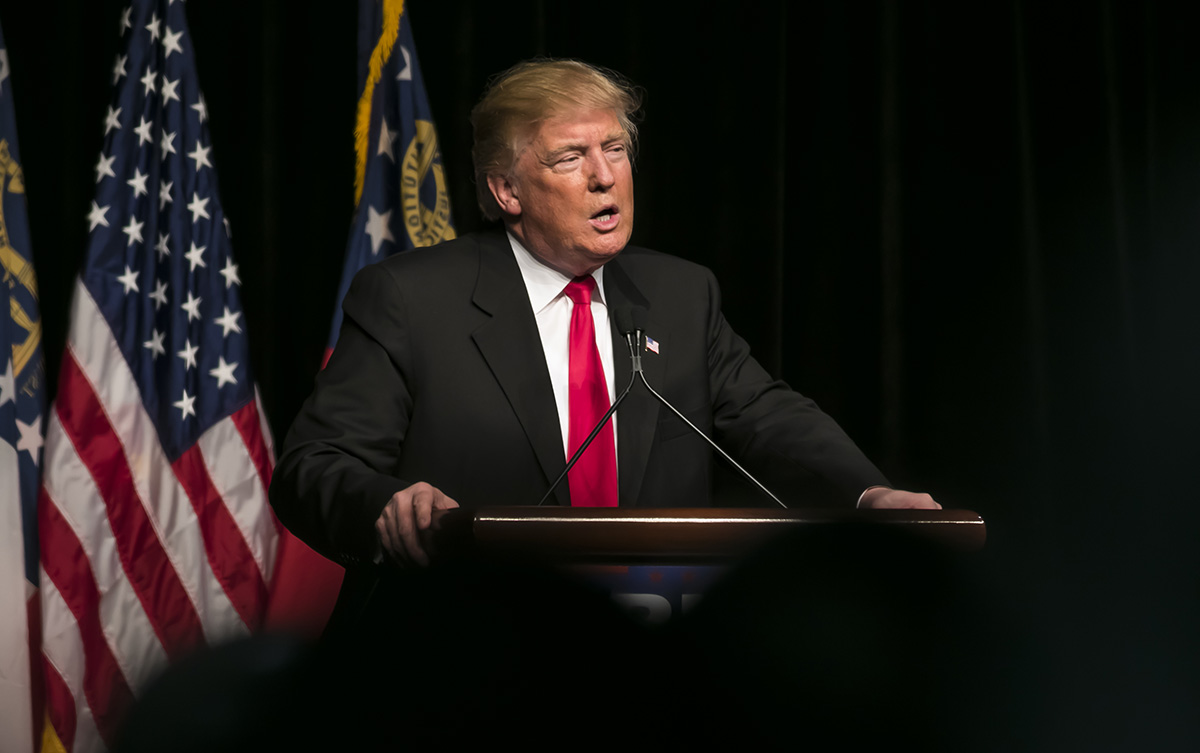
The Republican-controlled U.S. House Subcommittee on Labor, Health, and Human Services, Education, and Related Agencies approved a spending bill on June 26 that calls for cutting at least $419 million from federal AIDS programs that AIDS activists say would have a devastating impact on efforts to greatly reduce the number of new HIV infections by 2030.
The subcommittee’s proposed bill, which includes billions of dollars in cuts in a wide range of other federal health, education, and human services related programs, is scheduled to be considered by the full House Appropriations Committee on July 10. Officials with AIDS advocacy groups say they are hopeful that the full committee, like last year, will refuse to approve the proposed cuts in the AIDS budget.
The proposed GOP cuts would eliminate $214 million from the U.S. Centers for Disease Control and Prevention’s HIV prevention programs, $190 million from the Ryan White HIV/AIDS Program, and $15 million from the Department of Health and Human Services Secretary’s Minority HIV/AIDS Program.
Activists say the impact of those cuts would kill the federal government’s Ending the HIV Epidemic initiative, which among other things, calls for reducing the number of new HIV infections in the U.S. by 75 percent by 2025 and by 90 percent by 2030. The activists point out that ironically the Ending the HIV Epidemic initiative was launched during the administration of President Donald Trump.
“Instead of providing new investments in ending HIV by increasing funding for testing, prevention programs, such as PrEP, and life-saving care and treatment, House Republicans are again choosing to go through a worthless exercise of cutting programs that the American people depend on and will never pass,” said Carl Schmid, executive director of the HIV + Hepatitis Policy Institute.
“While we vigorously fight these cuts, we look forward to working with the entire Congress in a bipartisan fashion on spending bills that can actually become law,” Schmid said in a statement.
Schmid noted that the bill also includes provisions known as “policy riders” that would take away rights and protections from women, such as access to birth control and abortion, and for minorities, including LGBTQ people.
According to a statement released by the office of Rep. Rosa DeLauro (D-Conn.), who is the ranking minority member of the House Appropriations Committee, one of the policy riders would “block the Biden administration’s policies to ensure nondiscrimination on the basis of gender identity and sexual orientation.’ The statement says another policy rider would “prevent policies or programs intended to promote diversity, equality, or inclusion.”
Most political observers believe the Democratic-controlled U.S. Senate would also kill the GOP proposed policy riders and cuts in the AIDS budget if the full Republican-controlled House were to approve the budget bill passed by the appropriations subcommittee.
Rep, Tom Cole (R-Okla.), who serves as chair of the full House Appropriations Committee, released a statement on June 27 defending the subcommittee’s bill and its proposed spending cuts. “The bill provides appropriate and fiscally responsible funding to ensure these departments can continue to perform their core missions while also acknowledging the fiscal realities facing our nation,” he said.
“Importantly, the bill pushes back on the Biden administration’s out-of-touch progressive policy agenda, preventing this White House from finalizing or implementing controversial rules or executive orders,” Cole said in his statement. “It also preserves long standing bipartisan policy provisions protecting the right to life.”
Virginia
Man went on ‘homophobic rant’ inside Va. pub that displayed Pride flags
Suspect arrested on charges of public intoxication, assaulting police officer
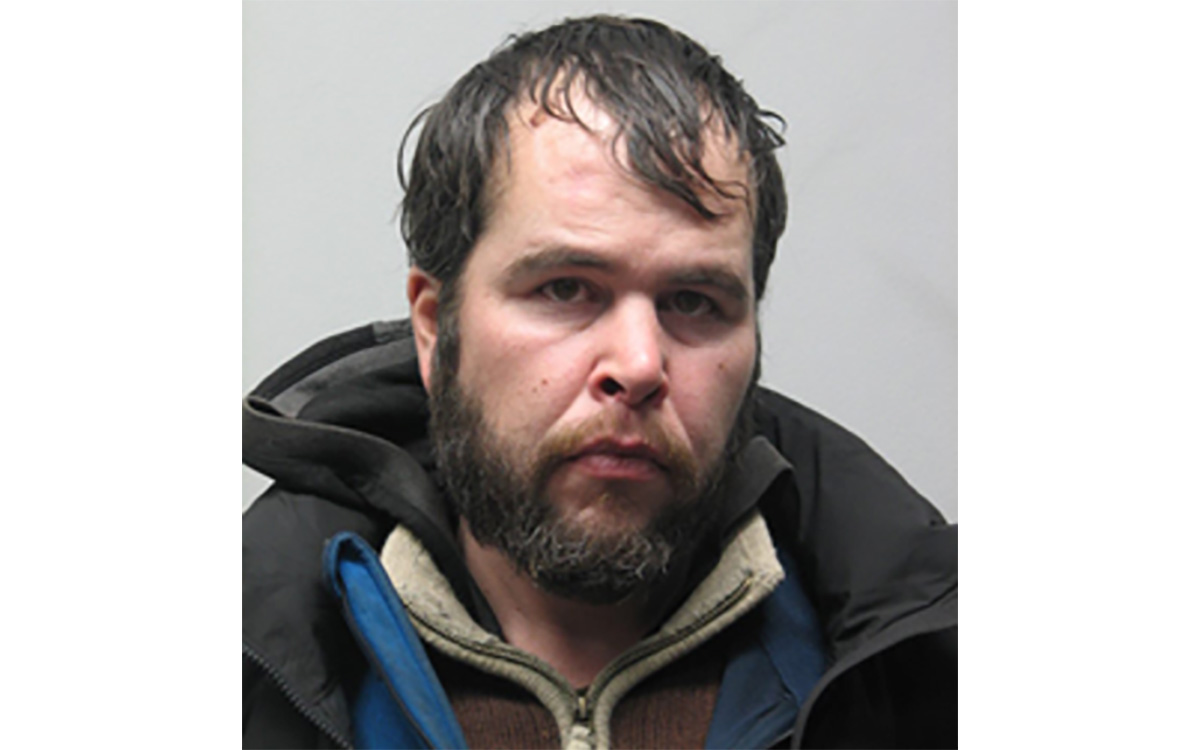
The Hawk & Griffin British Pub located in Vienna, Va., posted a message on Facebook last week saying a man was arrested after going on a “homophobic rant” inside the pub on June 28 when he saw that LGBTQ Pride flags were displayed at the pub for Pride month.
“Last night we had an incident here at the pub when a man came off the street to accost patrons in our beer garden because of our flags displayed for pride month,” the Hawk & Griffin Facebook posting says. “He then spit on our windows and came inside to confront our staff and patrons with homophobic rants,” the posting continues.
“Our manager and staff handled the situation very professionally and police were called to investigate and later arrested a man a couple of blocks away,” the message says. “We want to thank the Vienna Police Department for their quick response. We are and will continue to be community focused and we will never stop working to create and maintain a place of inclusion and tolerance,” the statement concludes.
Vienna police charged Justin Wayne Hendricks, of no known address, with misdemeanor counts of being “drunk in public” and providing false identification to a police officer and with a felony count of assault on a police officer. A police spokesperson said Hendricks was also found to be in violation of an outstanding arrest warrant from Alexandria, Va., related to a prior charge of failing to register as a sex offender.
The spokesperson, Juan Vazquez, said Hendricks is currently being held without bond at the Fairfax County Adult Detention Center. Online records for the Fairfax County General District Court show that Hendricks is scheduled to appear at a preliminary hearing on Oct. 9.
“On Friday, June 28, around 9:28 p.m. the Vienna Police Department responded to reports of an intoxicated individual threatening customers of the Hawk & Griffin,” a Vienna police statement says. “Upon the arrival of the officers the individual had already left the premises but was promptly located at an address nearby,” according to the statement.
The statement adds that Hendricks was subsequently charged with being drunk in public, providing false information about his identity to police, and assault on a police officer along with being served with the outstanding warrant related to the prior charge in Alexandria of failing to register as a sex offender.
Details of the prior sex offender charge couldn’t immediately be obtained from online court records. However, the online records show that Hendricks has at least a dozen or more prior arrests between 2014 and 2023 on charges including public intoxication, trespassing, and failing to register as a sex offender.
Police spokesperson Vazquez said it would be up to prosecutors with the office of the Fairfax County Commonwealth’s Attorney to determine if a subsequent hate crime related charge would be filed in the case.
-

 Canada2 days ago
Canada2 days agoToronto Pride parade cancelled after pro-Palestinian protesters disrupt it
-

 Theater5 days ago
Theater5 days agoStephen Mark Lukas makes sublime turn in ‘Funny Girl’
-

 Baltimore4 days ago
Baltimore4 days agoDespite record crowds, Baltimore Pride’s LGBTQ critics say organizers dropped the ball
-

 Sports4 days ago
Sports4 days agoHaters troll official Olympics Instagram for celebrating gay athlete and boyfriend



